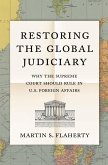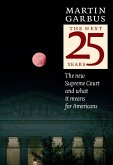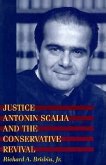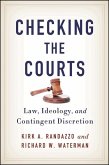The Conservative Revolution of Antonin Scalia
Herausgeber: Schultz, David A; Schweber, Howard
The Conservative Revolution of Antonin Scalia
Herausgeber: Schultz, David A; Schweber, Howard
- Broschiertes Buch
- Merkliste
- Auf die Merkliste
- Bewerten Bewerten
- Teilen
- Produkt teilen
- Produkterinnerung
- Produkterinnerung
This collection is a comprehensive and thorough assessment of the impact and legacy that Justice Antonin Scalia had on the Supreme Court. Chapters are written by leading legal and political science scholars of the Supreme Court and examine the lasting legacy of one of the most controversial Supreme Court Justices in American history.
Andere Kunden interessierten sich auch für
![Murder the Truth Murder the Truth]() David EnrichMurder the Truth28,99 €
David EnrichMurder the Truth28,99 €![Restoring the Global Judiciary Restoring the Global Judiciary]() Martin S FlahertyRestoring the Global Judiciary29,99 €
Martin S FlahertyRestoring the Global Judiciary29,99 €![The Next 25 Years The Next 25 Years]() Martin GarbusThe Next 25 Years13,99 €
Martin GarbusThe Next 25 Years13,99 €![Justice Antonin Scalia and the Conservative Revival Justice Antonin Scalia and the Conservative Revival]() Richard A BrisbinJustice Antonin Scalia and the Conservative Revival34,99 €
Richard A BrisbinJustice Antonin Scalia and the Conservative Revival34,99 €![Trust the Plan Trust the Plan]() Will SommerTrust the Plan16,99 €
Will SommerTrust the Plan16,99 €![Checking the Courts Checking the Courts]() Kirk A RandazzoChecking the Courts34,99 €
Kirk A RandazzoChecking the Courts34,99 €![First in Line First in Line]() Kate Andersen BrowerFirst in Line17,99 €
Kate Andersen BrowerFirst in Line17,99 €-
-
-
This collection is a comprehensive and thorough assessment of the impact and legacy that Justice Antonin Scalia had on the Supreme Court. Chapters are written by leading legal and political science scholars of the Supreme Court and examine the lasting legacy of one of the most controversial Supreme Court Justices in American history.
Produktdetails
- Produktdetails
- Verlag: Lexington Books
- Seitenzahl: 390
- Erscheinungstermin: 7. Juli 2020
- Englisch
- Abmessung: 229mm x 152mm x 21mm
- Gewicht: 522g
- ISBN-13: 9781498564502
- ISBN-10: 149856450X
- Artikelnr.: 74246064
- Herstellerkennzeichnung
- Libri GmbH
- Europaallee 1
- 36244 Bad Hersfeld
- gpsr@libri.de
- Verlag: Lexington Books
- Seitenzahl: 390
- Erscheinungstermin: 7. Juli 2020
- Englisch
- Abmessung: 229mm x 152mm x 21mm
- Gewicht: 522g
- ISBN-13: 9781498564502
- ISBN-10: 149856450X
- Artikelnr.: 74246064
- Herstellerkennzeichnung
- Libri GmbH
- Europaallee 1
- 36244 Bad Hersfeld
- gpsr@libri.de
David A. Schultz is professor of political science at Hamline University. Howard Schweber is professor of political science at the University of Wisconsin, Madison.
Introduction: Assessing Antonin Scalia's Place in Supreme Court History
David Schultz and Howard Schweber
Chapter 1: Scalia, Sissies, and Administrative Law
David Schultz
Chapter 2: Justice Scalia's Modest Employment Discrimination Law Legacy
Henry L. Chambers, Jr.
Chapter 3: Playing Defense in the "Culture Wars": Justice Scalia on Race,
Gender, and Sexual Orientation
Mary Welek Atwell
Chapter 4: Justice Scalia and Criminal Justice: A Mixed Record with
Conservative Impact
Christopher E. Smith and Charles F. Jacobs
Chapter 5: Threat and Suspicion: Scalia's Legacy for A Transnational
Judicial Dialogue
Maureen Stobb
Chapter 6: The Anti-Madison: Antonin Scalia's Theory of Politics
Howard Schweber
Chapter 7: Justice Scalia and the Legal Conservative Movement: An
Exploration of Nino's Neoconservatism
Jesse Merriam
Chapter 8: Justice Scalia and the Originalist Fallacy
Stephen M. Feldman
Chapter 9: The Jurisprudence of Justice Scalia: Common-Law Judging Behind
an Originalist Façade
Ronald Kahn and Gerard Michael D'Emilio
Chapter 10: Justice Scalia and Oral Arguments at the Supreme Court
Tim Johnson, Ryan Black, and Ryan Owens
Chapter 11: Justice Scalia's Concurring Opinion Writing
Ryan J. Owens and Christopher J. Krewson
Chapter 12: Justice Scalia's Confirmation Hearing Legacy
Alexander Denison and Justin Wedeking
Chapter 13: Was Antonin Scalia a "Great" Supreme Court Justice?
James Staab
About the Editors and Contributors
David Schultz and Howard Schweber
Chapter 1: Scalia, Sissies, and Administrative Law
David Schultz
Chapter 2: Justice Scalia's Modest Employment Discrimination Law Legacy
Henry L. Chambers, Jr.
Chapter 3: Playing Defense in the "Culture Wars": Justice Scalia on Race,
Gender, and Sexual Orientation
Mary Welek Atwell
Chapter 4: Justice Scalia and Criminal Justice: A Mixed Record with
Conservative Impact
Christopher E. Smith and Charles F. Jacobs
Chapter 5: Threat and Suspicion: Scalia's Legacy for A Transnational
Judicial Dialogue
Maureen Stobb
Chapter 6: The Anti-Madison: Antonin Scalia's Theory of Politics
Howard Schweber
Chapter 7: Justice Scalia and the Legal Conservative Movement: An
Exploration of Nino's Neoconservatism
Jesse Merriam
Chapter 8: Justice Scalia and the Originalist Fallacy
Stephen M. Feldman
Chapter 9: The Jurisprudence of Justice Scalia: Common-Law Judging Behind
an Originalist Façade
Ronald Kahn and Gerard Michael D'Emilio
Chapter 10: Justice Scalia and Oral Arguments at the Supreme Court
Tim Johnson, Ryan Black, and Ryan Owens
Chapter 11: Justice Scalia's Concurring Opinion Writing
Ryan J. Owens and Christopher J. Krewson
Chapter 12: Justice Scalia's Confirmation Hearing Legacy
Alexander Denison and Justin Wedeking
Chapter 13: Was Antonin Scalia a "Great" Supreme Court Justice?
James Staab
About the Editors and Contributors
Introduction: Assessing Antonin Scalia's Place in Supreme Court History
David Schultz and Howard Schweber
Chapter 1: Scalia, Sissies, and Administrative Law
David Schultz
Chapter 2: Justice Scalia's Modest Employment Discrimination Law Legacy
Henry L. Chambers, Jr.
Chapter 3: Playing Defense in the "Culture Wars": Justice Scalia on Race,
Gender, and Sexual Orientation
Mary Welek Atwell
Chapter 4: Justice Scalia and Criminal Justice: A Mixed Record with
Conservative Impact
Christopher E. Smith and Charles F. Jacobs
Chapter 5: Threat and Suspicion: Scalia's Legacy for A Transnational
Judicial Dialogue
Maureen Stobb
Chapter 6: The Anti-Madison: Antonin Scalia's Theory of Politics
Howard Schweber
Chapter 7: Justice Scalia and the Legal Conservative Movement: An
Exploration of Nino's Neoconservatism
Jesse Merriam
Chapter 8: Justice Scalia and the Originalist Fallacy
Stephen M. Feldman
Chapter 9: The Jurisprudence of Justice Scalia: Common-Law Judging Behind
an Originalist Façade
Ronald Kahn and Gerard Michael D'Emilio
Chapter 10: Justice Scalia and Oral Arguments at the Supreme Court
Tim Johnson, Ryan Black, and Ryan Owens
Chapter 11: Justice Scalia's Concurring Opinion Writing
Ryan J. Owens and Christopher J. Krewson
Chapter 12: Justice Scalia's Confirmation Hearing Legacy
Alexander Denison and Justin Wedeking
Chapter 13: Was Antonin Scalia a "Great" Supreme Court Justice?
James Staab
About the Editors and Contributors
David Schultz and Howard Schweber
Chapter 1: Scalia, Sissies, and Administrative Law
David Schultz
Chapter 2: Justice Scalia's Modest Employment Discrimination Law Legacy
Henry L. Chambers, Jr.
Chapter 3: Playing Defense in the "Culture Wars": Justice Scalia on Race,
Gender, and Sexual Orientation
Mary Welek Atwell
Chapter 4: Justice Scalia and Criminal Justice: A Mixed Record with
Conservative Impact
Christopher E. Smith and Charles F. Jacobs
Chapter 5: Threat and Suspicion: Scalia's Legacy for A Transnational
Judicial Dialogue
Maureen Stobb
Chapter 6: The Anti-Madison: Antonin Scalia's Theory of Politics
Howard Schweber
Chapter 7: Justice Scalia and the Legal Conservative Movement: An
Exploration of Nino's Neoconservatism
Jesse Merriam
Chapter 8: Justice Scalia and the Originalist Fallacy
Stephen M. Feldman
Chapter 9: The Jurisprudence of Justice Scalia: Common-Law Judging Behind
an Originalist Façade
Ronald Kahn and Gerard Michael D'Emilio
Chapter 10: Justice Scalia and Oral Arguments at the Supreme Court
Tim Johnson, Ryan Black, and Ryan Owens
Chapter 11: Justice Scalia's Concurring Opinion Writing
Ryan J. Owens and Christopher J. Krewson
Chapter 12: Justice Scalia's Confirmation Hearing Legacy
Alexander Denison and Justin Wedeking
Chapter 13: Was Antonin Scalia a "Great" Supreme Court Justice?
James Staab
About the Editors and Contributors









